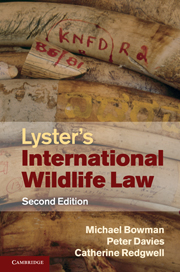Book contents
- Frontmatter
- Contents
- Foreword
- Preface
- List of abbreviations
- PART I Foundations of international wildlife law
- 1 The historical evolution of international wildlife law
- 2 Wildlife and the international legal system
- 3 The philosophical foundations of international wildlife law
- 4 Implementation and enforcement of international wildlife law
- PART II Species regulation
- PART III Regional wildlife regulation
- PART IV Global wildlife regulation
- PART V Biological diversity: a new perspective on wildlife regulation
- PART VI Cross-sectoral issues in wildlife regulation
- PART VII Conclusion
- Index
- References
3 - The philosophical foundations of international wildlife law
Published online by Cambridge University Press: 05 July 2011
- Frontmatter
- Contents
- Foreword
- Preface
- List of abbreviations
- PART I Foundations of international wildlife law
- 1 The historical evolution of international wildlife law
- 2 Wildlife and the international legal system
- 3 The philosophical foundations of international wildlife law
- 4 Implementation and enforcement of international wildlife law
- PART II Species regulation
- PART III Regional wildlife regulation
- PART IV Global wildlife regulation
- PART V Biological diversity: a new perspective on wildlife regulation
- PART VI Cross-sectoral issues in wildlife regulation
- PART VII Conclusion
- Index
- References
Summary
Introduction
Although it would be unrealistic to claim that international wildlife law has evolved in accordance with any grand philosophical strategy, all legislative initiatives are plainly intended to advance some significant underlying policy, and over time the sheer proliferation of treaty regimes has highlighted the need to establish some broader, overall direction and coherence in the system, based upon the developing aspirations and values of the international community. As it happens, wildlife law is nourished by a particularly rich tradition of theorising about the relationship between humankind and ‘nature’, and in recent decades environmental ethics have become a central concern of moral philosophy. Underpinning these deliberations is the recognition that the natural world embodies significant value, and should therefore be protected.
This chapter accordingly explores the question of natural value, first examining the various forms of value that have been identified within the natural world, before seeking to identify more precisely the specific entities in which such value resides. It concludes by analysing the mechanisms through which these various values may be quantified and compared. In each case, attention is given to the extent to which philosophical concepts and arguments have exerted any practical influence upon the evolution of international wildlife law.
- Type
- Chapter
- Information
- Lyster's International Wildlife Law , pp. 61 - 91Publisher: Cambridge University PressPrint publication year: 2010



